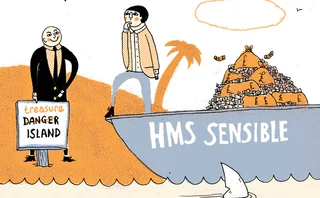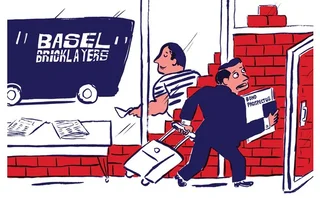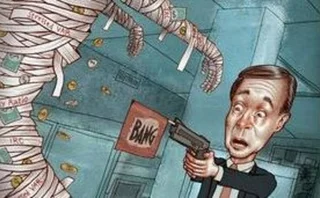
Lufthansa wary of OTC regulations
Corporates across the globe have lobbied to ensure end-users are not subjected to new clearing requirements for derivatives. For Lufthansa’s treasury department in Frankfurt, ensuring it is able to continue to hedge its foreign exchange and interest rate exposure effectively is top of the agenda. By Joel Clark

Airlines have had a lot to contend with recently. Soaring oil prices and falling demand for flights from both tourists and business travellers during the financial crisis caused many operators to slip into the red, but the slow economic recovery, coupled with the Icelandic volcanic ash cloud that closed European airspace in April, has also made this year far more challenging than many airlines could have envisaged.
German airline Lufthansa has been caught in the eye of the storm. Having racked up a net loss of €112 million in 2009, it reported a €298 million loss in the first quarter of 2010 alone – a figure it attributed to extreme winter weather and cockpit strike action. Second-quarter results, published on July 29, were a little more encouraging, with a profit of €194 million, despite the cumulative loss of €104 million for the first half of the year.
While the entire company struggles to cope with the difficult business environment, the airline’s finance department is preparing to face a number of different challenges – specifically, ensuring new regulations on over-the-counter derivatives proposed by the European Commission (EC) do not hamper its ability to manage foreign exchange and interest rate risk.
“Risk management is crucial to enable airlines to run stable businesses, manage cashflows and undertake business planning. While we understand the need to regulate speculative financial transactions in the light of the financial crisis, we have tried to urge regulators to avoid damaging the industry with burdensome and unnecessary regulation,” says Roland Kern, head of treasury at Lufthansa’s headquarters in Frankfurt.
The stakes couldn’t be much higher for Lufthansa and the airline industry. According to its own analysis, European airlines use more than 300 million barrels of jet fuel each year, and the extreme volatility in oil prices since early 2008 has generated $27 billion in cost uncertainty. That means any regulation that makes derivatives harder or more costly to use could be catastrophic for the industry, says Kern.
Fuel hedging may be the most obvious element of any airline’s risk management, but it doesn’t fall directly under Kern’s responsibility. A 16-strong team based in Hamburg manages all of Lufthansa’s fuel purchase and hedging activities, leaving Kern to manage its forex and interest rate exposure.
Foreign exchange is a critically important exposure for the airline, as international ticket sales, fuel purchase and aircraft maintenance all give rise to currency risks, with Lufthansa exposed to a total of 60 separate currencies. Under its current hedging strategy, all subsidiaries report their expected currency exposures to the treasury over a two-year time horizon, and a net position is then aggregated for each currency to determine any possible natural offsets. Active hedging is conducted in 20 of the 60 currencies.
Lufthansa is usually a net payer in dollars as its fuel purchases are dollar-denominated, and has a surplus in other currencies. Its main currency risk stems from its exposure to the dollar, yen and sterling, and it hedges over a 24-month period using currency futures and spread options. At the end of 2009, its projected two-year exposure from operations was negative $8.4 billion, positive ¥138.4 billion and positive £671 million. At that time, its currency hedges for the next two years were worth positive $3.7 billion, negative ¥56.7 billion and negative £185 million.
Before joining Lufthansa, Kern worked at Deutsche Bank for 22 years, most recently in its risk management advisory practice for corporates and public-sector firms. In that capacity, he worked on a major project in 2005 to re-engineer Lufthansa’s finance strategy, which also involved the development of new hedging rules – an effort that led him to make the career move.
“The new rules we put in place for currency hedges mean we hedge on a regular basis and have no intention of putting on sudden hedges as exchange rates fluctuate. This systemic approach seems to have been successful during the financial crisis,” says Kern.
But the success of Lufthansa’s hedging, in forex as well as commodities and interest rates, could be thrown into turmoil by the advent of new regulation for OTC derivatives. As a major derivatives user, it has been at the forefront of corporate lobbying of rule-makers to ensure the new regulations take full account of their needs and do not jeopardise management of risk.
“The current plans to regulate OTC or off-exchange trading in derivatives in the US and Europe in response to the financial crisis are of great significance for Lufthansa and for companies in a wide range of industries,” the airline stated in its annual report for 2009, sketching out the argument that mandated use of clearing through central counterparties (CCPs) would force the posting of unrealistic amounts of cash collateral that could adversely affect corporates.
Derivatives legislation in the US and Europe has advanced significantly over the past two months and individual companies, as well as corporate treasury associations, have been busy dissecting legislative texts to determine how they might be affected. The Dodd-Frank Wall Street Reform and Consumer Protection Act, which was signed into law in the US on July 21, requires central clearing only by swap dealers and major swap participants that maintain ‘substantial’ swaps positions, leaving the exact definitions for regulators to decide on.
In Europe, a similar situation seems to be evolving. Although draft legislation is not expected to be published until early September, the EC published a preliminary consultation paper on derivatives and markets infrastructure on June 14, revealing the current thrust of its plans.
The EC paper suggests a system of two thresholds, in which non-financial derivatives counterparties that take positions exceeding an information threshold would need to notify authorities, which may then require an explanation of the end-user’s activities and regular reports on its positions. But more worryingly for corporates, the EC believes any non-financial user whose positions exceed a designated clearing threshold would be subjected to a clearing obligation for all its eligible derivatives contracts. Like the Dodd-Frank Act, the EC has so far omitted any numerical definitions, stating the thresholds will be defined at a further stage, “taking into account the systemic relevance of the sum of net positions by counterparty per class of derivatives”.
While the EC has advanced from an initial position paper it published in July 2009, which paid no attention to the needs of corporates, Kern remains concerned the clearing threshold will catch large companies like Lufthansa, whose derivatives activity may be substantial, but which he claims poses no systemic threat.
“Defining the threshold will inevitably lead to discrimination against the biggest companies – we have large derivatives positions only because our underlying economic business is large. But the true corporate business does not pose a systemic risk, so even though we were not involved in the financial crisis, we are being forced to pay the bill in this regulation,” says Kern.
The costs of paying that bill could be vast. Pointing to the decline in the price of crude oil in 2008 from $147 a barrel to $40 a barrel, Kern estimates it would have cost Lufthansa €2 billion–3 billion in cash collateral to hedge such a move through a CCP.
“Our industry simply does not have access to this type of liquidity. Collateral obligations would result in an increase in liquidity risk and limit the use of hedging, ultimately increasing risk and possibly threatening the continued existence of some airlines,” argues Kern.
But the threat wouldn’t necessarily disappear with the abolition of the EC’s clearing threshold and a full exemption for corporates. The consultation paper also describes special risk mitigation requirements for non-cleared bilateral contracts, including “timely and accurate exchange of collateral and appropriate and proportionate holding of collateral”. Although such a requirement has still to be explained and fleshed out in the EC’s final legislation, it is sending shivers down the spines of many corporate treasurers.
“That could mean all OTC transactions have to have accompanying cash collateral, meaning the problem is not just about central clearing. It could be a real problem, because collateralisation is anything but a risk mitigation technique. It is more of a risk accelerator, as we saw in the financial crisis when unjustified collateral obligations caused severe liquidity risks. Regulatory steps should limit the exchange of collateral rather than promote it,” says Kern.
The advent of new capital and liquidity requirements for banks is also a concern for large corporates such as Lufthansa, and Kern has been closely following the evolution of reforms to the Basel II framework. Specifically, a capital charge for credit value adjustment (CVA) could have certain unintended consequences for corporates, he believes.
Earlier this year, Kern commissioned an accounting simulation to determine how the CVA charge on banks would impact Lufthansa’s own cost of hedging. Based on the original methodology proposed by the Basel Committee on Banking Supervision in December 2009, it showed hedging costs would increase by 300–500%. In reality, the effect is likely to be less than that, as the Basel Committee agreed on certain changes to the CVA charge on July 26 (see pages 27–29), but it remains an area of concern.
“It’s important to bring higher capital requirements to banks, but it’s the same discussion about unintended consequences as we have had in connection to derivatives. Regulators must clearly differentiate between the corporate sector and the banking sector and make sure they are not putting corporates under undue pressure,” says Kern.
Only users who have a paid subscription or are part of a corporate subscription are able to print or copy content.
To access these options, along with all other subscription benefits, please contact info@risk.net or view our subscription options here: http://subscriptions.risk.net/subscribe
You are currently unable to print this content. Please contact info@risk.net to find out more.
You are currently unable to copy this content. Please contact info@risk.net to find out more.
Copyright Infopro Digital Limited. All rights reserved.
You may share this content using our article tools. Printing this content is for the sole use of the Authorised User (named subscriber), as outlined in our terms and conditions - https://www.infopro-insight.com/terms-conditions/insight-subscriptions/
If you would like to purchase additional rights please email info@risk.net
Copyright Infopro Digital Limited. All rights reserved.
You may share this content using our article tools. Copying this content is for the sole use of the Authorised User (named subscriber), as outlined in our terms and conditions - https://www.infopro-insight.com/terms-conditions/insight-subscriptions/
If you would like to purchase additional rights please email info@risk.net
More on Corporates
Credit where it's due
IFRS 9 sweeps away centuries-old accounting conventions; banks look to frontload capital hit
Indian corporates count forex losses from rupee depreciation
Living on the hedge
Corporate cash seeks new home as money-market reforms loom
New regulation on both sides of the Atlantic threatens to make money-market funds less attractive for corporate treasurers. Banks are hoping this cash will flood into fixed-term deposits instead, helping them meet incoming liquidity ratios, but they’re…
Risk 25: How Basel III is turning borders into barriers
Turning borders into barriers
Treasurers highlight unintended consequences of regulation
Corporate treasurers complain about the unintended consequences of the proposed financial transaction tax, as well as clearing rules for OTC derivatives
Corporate backlash on costs of regulation continues
Banks will not be able to avoid passing on the hefty costs of regulatory reform to their buy-side clients, argued participants at the ACI UK’s annual square mile debate
Prepare for further black swan events in FX, corporates told
Corporate treasurers should make sure their forex counterparties are properly prepared for the possibility of further black swan events in the foreign exchange markets, senior Lloyds banker tells ACT conference delegates in Manchester
Corporate profile: Containing risk at China’s CSCL
Containing risk







